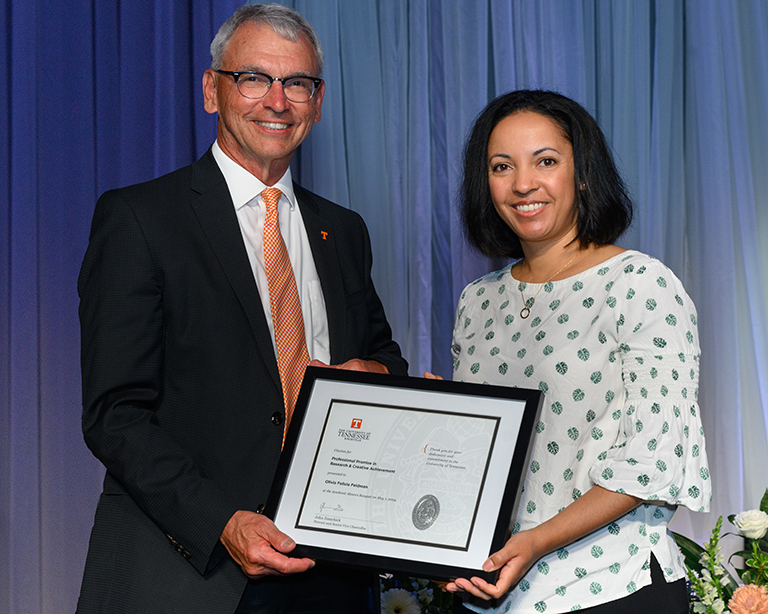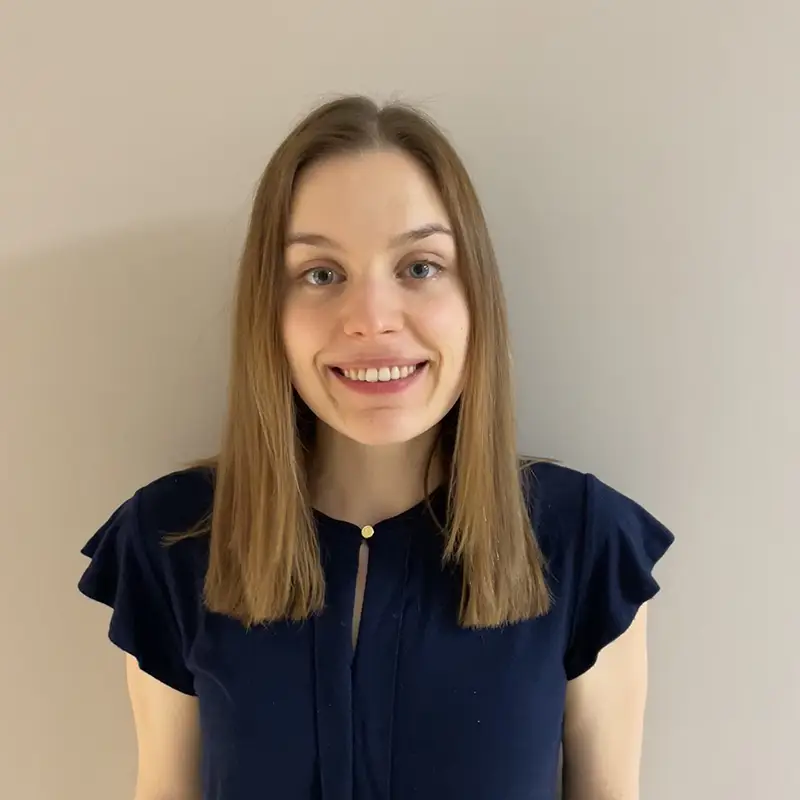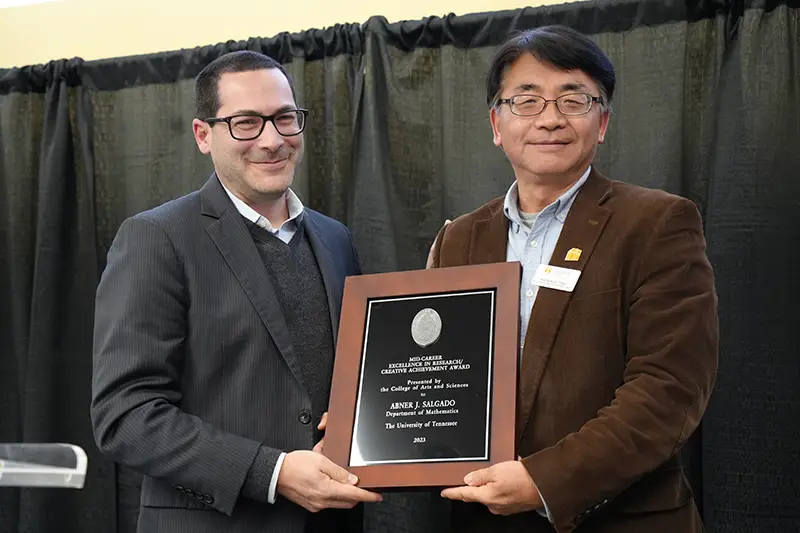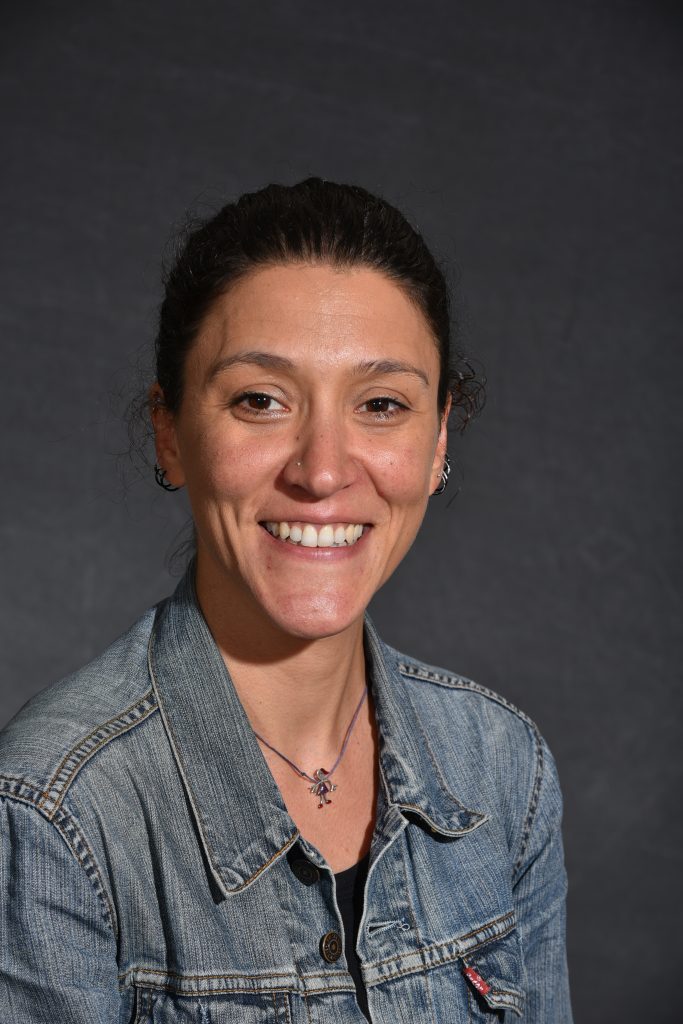2024 Professional Promise in Research and Creative Achievement
Olivia Feldman receives Chancellor’s Honor.
Dr. Olivia Feldman (formerly Prosper) is an Associate Professor of Mathematics working at the interface of mathematics and biology, with a focus on infectious disease modeling. She earned her Ph.D. in Mathematics from the University of Florida in 2012, which was followed by a postdoc at Dartmouth College. In 2021, Dr. Feldman received an NSF CAREER grant and Intercollegiate Biomathematics Alliance Excellence in Research award.
What does being a Volunteer mean to you? How has UT empowered you to make a difference in a way you might not have imagined elsewhere?
“I am grateful for the mentors throughout my life and career who have contributed to my success in unique ways. Being a Vol means passing that on to the next generation of students at the University of Tennessee, and using my skills to give back to my community. At UT, I’ve had the opportunity to engage non-STEM students in quantitative work outside the classroom. Observing the creativity spurred from that venture inspires me to continue seeking mathematical potential where it may be overlooked.”

Model Modern Mathematician

by Randall Brown
Mathematics major Kristina Wilson of Athens, Tennessee, graduates this spring as an honors student who has excelled in her academic coursework and research projects, succeeding in both honors-level and graduate courses.
“My time as a Volunteer has been memorable because UT and the math department have provided me with opportunities to learn and develop as a mathematician in a supportive environment,” said Wilson. “The math professors at UT are encouraging of their students. They are so passionate, and they want students to learn math and share their passion too.”
Wilson engaged in multiple research experiences as an undergraduate Vol, including initiating a summer project mathematically modeling infectious disease with Associate Professor Olivia Feldman in summer 2022.
“Over the course of three semesters, Kristina far exceeded my expectations in my Junior Modelers Program, JuMP, both as a participant and a leader,” said Feldman. “She demonstrated the ability to collaborate and mentor effectively and work diligently on new and challenging quantitative problems related to mathematical epidemiology.”
After the first session of JuMP, Wilson and a student colleague in computer science proposed and co-authored a paper on modeling research as a summer research project—an impressive achievement for an undergraduate student.
“I was blown away by her ability, along with her partner, to advance this project from week to week through her own initiative and thirst to learn new skills,” said Feldman. “Kristina’s genuine passion for learning challenging things made her a joy to work with.”
During spring 2023, Wilson worked as an undergraduate research assistant with Assistant Professor Ioannis Sgouralis to develop specialized numerical integration schemes for machine learning and the analysis of biochemistry data.
“Kristina is an exceptionally bright student whose aptitude for addressing applied science problems truly stands out,” said Sgouralis. “Her proficiency extends beyond her impressive mathematical capabilities; she is also an accomplished computer scientist.”
Wilson integrated her methodical mathematical background with her programming skills to link theoretical models with empirical observations and simulate the appearance of complex datasets.
“Her work is also communicated with clarity, which underscores her deep passion for cross-disciplinary research,” said Sgouralis.
Wilson also worked on a summer research project implementing routines in a matrix algebra library. She collaborated with visiting students from the City University of Hong Kong and the Chinese University of Hong Kong through UT’s National Institute for Computational Sciences.
“I’ve spent a lot of time on this project, and it has helped me improve my math and computer science skills further,” she said.
Throughout her time at Rocky Top, Wilson has enjoyed great camaraderie with her fellow math students.
“We work together really well,” she said. “When we work in groups, it’s not a competition of who can look the smartest or have the best idea, it’s about getting the problem done together. This environment at UT has allowed me to learn and figure out what I’m passionate about and has allowed me to pursue my interests.”
After graduation Wilson is headed for Nashville to pursue her PhD in mathematics at Vanderbilt University. Her advice for future Vols is to maintain a Big Orange balance in their studies and campus life.
“College will be stressful, challenging, and gratifying,” said Wilson. “Don’t forget to enjoy the good parts too.”
The College of Arts and Sciences congratulates Kristina Wilson for graduating with her successful record of research projects and representing her Big Orange pride and confidence with her in future endeavors.
Salgado Recognized for Excellence in Research

Abner Salgado, professor of mathematics, received the Excellence in Research & Creative Achievement Award for Mid-Career Faculty at the 2023 College of Arts and Sciences Faculty Convocation.
Salgado received his PhD from Texas A&M University in 2010 and joined the faculty of UT in 2013 after finishing his postdoc at the University of Maryland with research in numerical analysis. He is a very talented numerical analyst, one of the best in the country in his generation.
During the past 10 years at UT, Salgado’s research has focused on the design and analysis of efficient yet accurate computational algorithms for solving PDEs which describe fractional diffusion and complex fluids. He is a world leader in these areas and has been invited to deliver plenary presentations in the country and around the world. Salgado has a phenomenal record of research productivity, with over 80 publications and many of them have appeared in the most prestigious journals in his research area. His research has been continuously supported by NSF in the past 10 years.
In 2022, Salgado and his UT colleague Steven Wise published a mammoth textbook—almost 1,000 pages—titled Classical Numerical Analysis: A Comprehensive Course, by Cambridge University Press. The book received very good reviews.
Bourni Opens International Connections for Geometric Flow

A UT Department of Mathematics professor’s collaboration earned National Science Foundation (NSF) support and created an opportunity for a group of Vol graduate students and others to connect internationally with experts on the forefront of mathematics.
Associate Professor Theodora Bourni coordinated with Professor Martin Reiris of Uruguay’s Universidad de la República to organize the Geometric Flows and Relativity school and workshop March 11–20, 2024, in Uruguay.
The two-part meeting will feature a week-long summer school in Montevideo, Uruguay, followed by a three-day workshop in nearby Punta del Este. The school will provide attendees first-hand access to current research in geometric flows, a powerful tool in the analysis of many important problems in differential geometry, image processing, and mathematical physics, with a profound impact on each of these fields.
The event grew from smaller-scale classes Bourni and Reiris previously presented in Uruguay, and similar classes Bourni presented over the years in Greece, where she is from.
“We did a kind of mini-course, and a lot of local students attended it,” said Bourni. “So, we said, ‘Let’s try something bigger.’”
Reiris secured local funding in Uruguay to get their plan established, then Bourni sought the NSF grant to expand the potential for attendance from US schools and to invite participation from international scholars. The roster of invited lecturers includes Mat Langford of the Australian National University, Mariel Sáez of the Pontífica Universidad Católica de Chile, and Julian Scheuer of the Goethe Universität, Frankfurt, Germany.
UT graduate students George Babus, Nathan Burns, Alex Squires, and Bryan Walker will accompany Bourni to Uruguay for the class. They will have opportunities to interact with the visiting specialists and exchange ideas with other attendees, many of whom will be mathematicians and students from across South America.
Bourni looks forward to the insight the courses will give her students, who will bring the benefits of their experience back to UT. The interaction also builds connections to UT for international students who attend.
“This will make a new bridge to bring talented students here, and vice versa, you know,” she said. “Once they meet my collaborators, our students could go there to spend some time.”
Bourni has also seen the positive, goodwill results of bringing coursework like this to areas that might not have the resources to organize events with international participation.
“If you go to smaller universities with less opportunities, people are very positive when you do things like this,” she said. “You get a lot of students interested in these events, and they’re very appreciative.”
Bourni hopes to be able to build on this year’s school for future international collaborative events to share the latest developments in the area of geometric flows.
“I would like to do something bigger again, with either South America or with Greece,” she said. “This would be a good opportunity to get more people interested in such events, and try to create a more established connection between UT and Uruguay, but also other places in South America.”